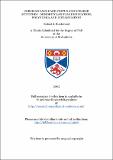Corsican language status and speaker attitudes - minority language education, polynomia and distanciation
Abstract
An interesting language contact situation exists on the French island of Corsica, where French is the official national language but where Corsican, the island's minority language, is also in use and where Tuscan Italian, a previous official language, continues to exert a certain influence. The Corsican language is a cause espoused by the nationalist movements on the island, some of whom resort to violence and terrorism to force the government in Paris to address issues relating to the administration of Corsica. The extension of the Corsican language features amongst the demands made by the nationalists, who use the language in their high- profile campaigns. However, the Corsican language is not widely heard across the island, where no Corsican monolinguals are left alive and where French is the lingua franca. Whilst French is the language of communication, support for the Corsican language appears to be strong. This Thesis seeks to gauge the opinions of islanders, both corsophone and non-corsophone, to the language and its use. Of particular interest currently is the debate surrounding compulsory Corsican language classes for school children, and the attitudes of Corsicans to this question is addressed in this project. At the island's university in Corte, a number of academics, language activists and some politicians are engaged in work on the language, proposing a polynomic model for Corsican to extend the use of the language. Others are devoting time to differentiating the language from French, in an attempt to refine a 'purer' Corsican. This Thesis assesses the attitudes of islanders to these questions in order to provide an overview of the language situation on Corsica and to draw together proposals for those seeking to reverse the language shift to French.
Type
Thesis, PhD Doctor of Philosophy
Collections
Items in the St Andrews Research Repository are protected by copyright, with all rights reserved, unless otherwise indicated.

